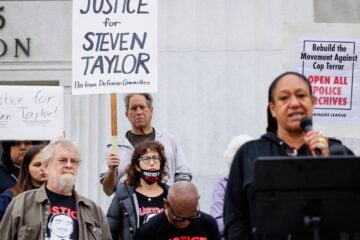FCC plan could give LPFM apps an edge over FM translators
Applicants for thousands of FM translators may have to reapply if the FCC goes through with its proposal to give new low-power FM stations a chance to compete for the same frequencies.
In a July 12 Notice of Proposed Rule Making, the FCC asked for public feedback on a proposal to resolve a years-old backlog of applications for FM translators — low-power stations that relay the signals of full-power FM stations. The commission began a long hiatus from granting translator licenses in 2005 due to concerns that the new relay transmitters could crowd out potential LPFMs, a newer category of 100-watt noncommercial FMs introduced to originate programming.
Like earlier struggles over LPFM rules, these policy decisions pit existing stations — including public stations trying to extend service using translators — against the commission’s plan for bringing new community voices to radio.
FCC rules give LPFMs and translators equal standing for interference protection; both are secondary to full-power FM stations. But the FCC now must determine how to treat both classes of stations fairly as it prepares to grant more licenses for LPFMs. In December 2010 Congress passed legislation to allow LPFMs to sign on in urban areas where they were previously shut out of available spectrum.
The Local Community Radio Act reversed a law that barred LPFMs from broadcasting on frequencies that are third-adjacent to full-power stations. In its July 12 rule making, the FCC said that it might accept applications for these new LPFMs as soon as next summer.
An analysis accompanying its rule making also gives a first glimpse at how many LPFMs might be able to sign on and where they could broadcast. Dallas-Fort Worth, the fifth-ranked Arbitron market and the largest with room for any LPFMs, might have room for two; Houston could have three. Minneapolis-St. Paul could accommodate as many as 13, according to the FCC’s analysis.
All told, more than 1,000 LPFMs could be added in the country’s 100 largest Arbitron markets, though the FCC’s assessment may not be entirely accurate. More than 800 LPFMs already are broadcasting, mostly in less populous areas.
The rule making is the latest development in an ongoing FCC proceeding watched by stakeholders including religious broadcasters, public radio stations, and LPFM stations and their advocates. Like the FCC policymakers, the supporters of LPFM have worried that granting too many translator permits could limit the potential for new low-power stations, which they say provide valuable local services to communities.
Meanwhile, full-power broadcasters who use translators to expand their reach and grow audiences, such as NPR and religious stations, have rallied to protect the translators. NPR responded to the commission’s proposal in a statement last week: “We look forward to working with the FCC to ensure that FM translators, which help local public radio stations provide valuable local content and services to their audiences, continue to have adequate spectrum to meet the needs of their communities.”
Nearly 2,000 apps could go
The FCC rule making advocated a policy that would give new LPFMs a chance while still allowing for some translator permits to be granted. Under its proposal, the commission would toss out about 1,800 applications already vying for translators in large markets.
The agency would then accept and process applications for LPFMs in those markets. After that point, it would once again accept translator applications in those areas.
Meanwhile, the FCC would be able to proceed with processing applications for translators in smaller markets where another 3,000 applications are pending.
“It is axiomatic that community groups and niche audiences are more plentiful in larger, more densely populated markets and, therefore, that there is a need for greater numbers of LPFM stations in such markets,” the commission said. “Moreover, we think that it is important that our translator processing policy, to the extent possible, ensure that there is sufficient spectrum to establish a robust, dynamic and permanent LPFM service in larger markets.”
Broadcasters and advocates following the issue are analyzing the rule making and preparing their reply comments, which will be due at the FCC 30 days after the rule making is published in the Federal Register. So far, however, stakeholders agree that the FCC has put forth a reasonable compromise.
“Having a flexible solution like this, that tailors the outcome in particular places to the actual reality on the ground there, is a good one,” said Brandy Doyle, policy director for the Prometheus Radio Project. The Philadelphia-based organization helps low-power broadcasters apply for and launch new LPFMs.
“It looks like the FCC is taking the right step forward in terms of trying to ensure that those opportunities for LPFM exist at all,” said Casey Rae-Hunter, deputy director of the Future of Music Coalition. Without such a compromise, the opportunity for new LPFMs could “just completely go away,” he said.
Rae-Hunter points out that LPFMs can be especially important in promoting local music and community interests at a time when colleges are selling off student-run stations. Based in Washington, D.C., the Future of Music Coalition advocates on behalf of independent musicians.
National Religious Broadcasters is also giving tentative support to the proposal, said Craig Parshall, senior v.p. and general counsel. The FCC proposal is a “good compromise,” Parshall said. NRB’s ranks include LPFM operators but also full-power stations that rely on translators, some with applications pending in the urban markets that could be voided under the FCC’s proposal. But even these members have so far expressed approval for the compromise, Parshall said.
“We’re waiting with some caution” to see how the FCC addresses some of the unresolved issues raised in the rule making, he said. Parshall didn’t know whether NRB would comment on the FCC proposal.
Limit on translators?
The translator applications awaiting review were filed in a 2003 window that brought in more than 13,000 applications. The sheer number of applications prompted charges that some applicants were abusing the system.
The 15 most prolific filers put in more than half of the applications. Two related religious broadcasters based in Idaho — Radio Assist Ministry and Edgewater Broadcasting — together filed more than 4,000 applications.
RAM and Edgewater went on to receive more than 1,000 licenses and then sought to give or sell more than half of them to other broadcasters, a practice that technically passes muster with FCC rules but that drew criticism from advocates for noncommercial radio. The FCC expressed concern that “such heavily skewed filing activity compromised the integrity of our FM translator licensing procedures.”
In 2005 the FCC froze processing of any more translator applications and, in 2007, it said it would only consider 10 applications from each applicant. Common Frequency, a nonprofit that supports grassroots radio, raised concerns that even a 10-application limit would not necessarily enable more LPFMs to get channels in urban areas. The FCC took Common Frequency’s concerns into account and produced its own analysis supporting that conclusion.
Clark Parrish, president of RAM and Edgewater Broadcasting, supports the FCC’s proposal for handling the translator backlog, calling it “about time.” His companies had opposed the cap on translator applications because it was too arbitrary, Parrish said.
Parrish also objects to how the FCC has portrayed his organizations in the rule making. “We followed the rules,” he said. “One of Radio Assist’s goals is to facilitate broadcasting in the U.S., and just because we filed a large number of applications . . . I don’t get it. I don’t understand what their issue is.”
The FCC’s July 12 rule making also seeks comment on whether the agency should put a limit on translator applications in markets beyond the urban areas in question and how the commission might prevent further abuses of the process for applying for translators.
Prometheus Radio Project still believes the commission should limit the number of translator applications per applicant, Doyle said. The religious broadcasters’ group, NRB, wanted a limit, but a looser one of 50 instead of the FCC’s proposed cap of 10. But the FCC’s proposal to throw out applications in larger markets may have made the cap a moot issue, Parshall said.
RAM and Edgewater might still oppose any limit, Parrish said. “I’m concerned that some translators are still going to get thrown away needlessly, and I’d hate to see that.”
1,000 OR 2,000 NEW LPFM STATIONS?
The FCC roughly estimated that more than 1,000 new LPFMs could be fitted into the 100 largest radio markets. There wouldn’t be many in the 15 largest metro areas, but for example there’s room, theoretically, for 13 new LPFM stations in the Twin Cities, 11 in St. Louis, 42 in El Paso and 49 in Madison, Wis.
In some cities, the markets are large enough that the same frequency could be used by multiple low-power stations.
Here’s a table showing how many sites in about 150 areas could accommodate new LPFM stations as estimated by the FCC.
EARLIER STORIES
Interference study finds room for more low-power FMs, August 2003.
At five, LPFM takes all comers, 2005. In smaller cities where a less crowded FM dial allows LPFMs to start up, listeners are discovering music, news reports, opinions and esoterica in an array of styles and languages.
Pubradio rejects higher status for low-power FM, 2008
House panel endorses compromise that would add LPFM stations, October 2009.
Community Radio Act was approved by Congress late in 2009 and signed into law Jan. 5, 2010. Text of law (PDF).
RELATED LINKS
FCC’s July 12 rule making notice (PDF).
Prometheus Radio Project, progressive media reform group based in Philadelphia.
Besides Prometheus, the Radio for People Coalition includes Common Frequency, based in Davis, Calif.; Free Press; the Future of Music Coalition; Pacifica Radio; National Federation of Community Broadcasters; and Public Radio Capital.





